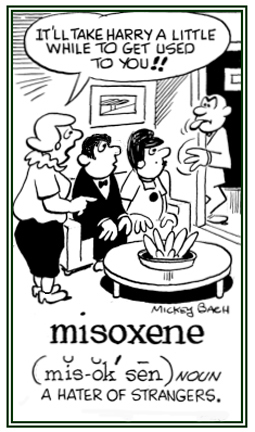xeno-, xen-, -xenic, -xenism, -xenist, -xenous, -xeny
(Greek: foreign, foreigner; alien; different; extraneous; strange, stranger; and by extension, guest)
The "x" in xeno- is pronounced "z"; "zeno". Greeks are said to have considered any stranger a "guest" and modern Greek includes xenodocheion a "guest house" or "house for guests" or its modern version of "hotel".
The etymological meaning usually denotes some aspect of a relationship involving guests or visitors of some kind.
2. Different parasites occupying the same host splecies.
2. Deserting its host; said of certain parasitic fungi which after a time quit the plant which served as a host for them.
2. Parasitic existence on different hosts at different stages in life-history; also, metoecious and heteroecious.

Go to this Word A Day Revisited Index
so you can see more of Mickey Bach's cartoons.
Even pets; such as, dogs or cats, will attack strangers because such people are despised and not welcome.


The scenes above represent an actual attack by a cat upon a postwoman in Germany in early 2002; because, whenever she tried to deliver a man's mail the cat would jump out and bite and claw her.
The owner of the misoxenist had to pick up his mail at a neighborhood bar because he refused to restrict the freedom of his cat to come and go whenever it wanted to do so.
2. Parasites adapted to life in only a few species of hosts.


